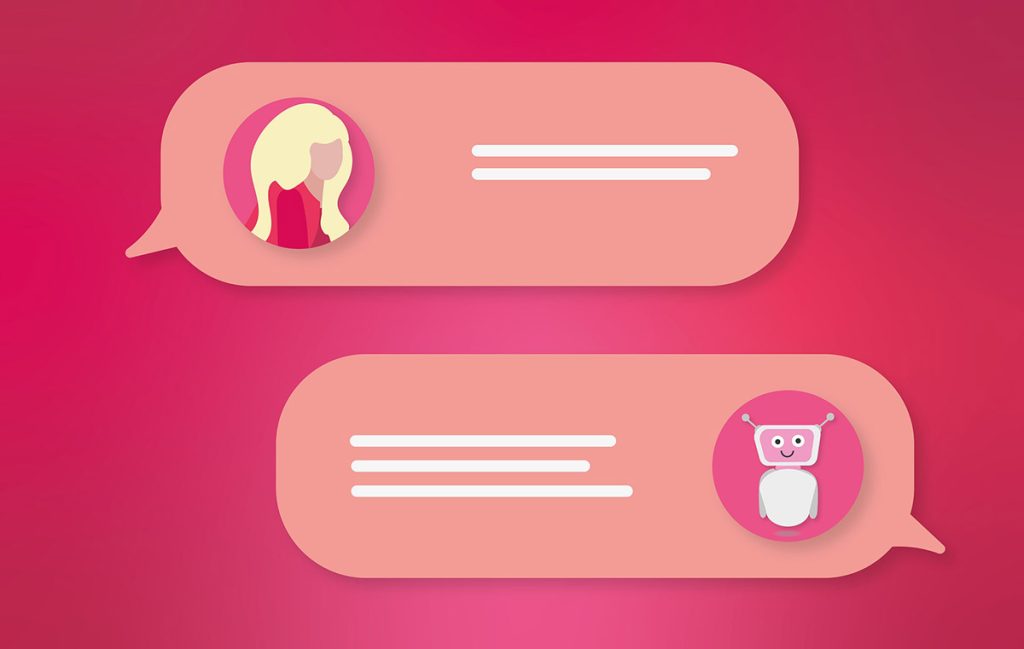Utilizing Chatbots for Enhanced Customer Engagement

Customer engagement is a vital aspect of any successful business strategy. With the increasing role of chatbots in customer interaction, companies are discovering new ways to enhance their customer engagement efforts. Chatbots offer real-time, personalized assistance to website visitors, addressing their inquiries promptly and efficiently.
Businesses are leveraging chatbots to streamline customer engagement, providing instant solutions to common issues and frequently asked questions. This not only improves customer satisfaction but also reduces the burden on human support agents, allowing them to focus on more complex tasks.
Furthermore, the utilization of chatbots in customer engagement contributes to improved operational efficiency and cost savings. By automating routine interactions, businesses can allocate resources more effectively and ensure 24/7 availability for customer inquiries.
In this blog post, we’ll delve into the benefits of incorporating chatbots into your customer engagement strategy and explore why it’s crucial for businesses to embrace this technology in today’s competitive market. We’ll highlight the potential advantages and share insights on how chatbots can revolutionize the way businesses connect with their customers.
Understanding Chatbots and Customer Engagement
Chatbots have become a ubiquitous feature in the digital landscape, revolutionizing the way businesses interact with their customers. In this section, we will delve deep into the world of chatbots, understanding their significance in customer engagement.
What Are Chatbots?
Chatbots are computer programs designed to simulate conversation with human users, typically through text or voice inputs. These automated systems are powered by artificial intelligence (AI) algorithms, enabling them to understand and respond to user queries in a conversational manner. Chatbots can be integrated into various platforms, including websites, messaging apps, and social media channels, providing users with instant access to information and support.
The Role of Chatbots in Customer Engagement
Chatbots play a pivotal role in enhancing customer engagement by delivering personalized and timely interactions. Through intelligent automation, chatbots can efficiently handle routine customer inquiries, such as FAQs, product information, and order status updates. By doing so, they free up human support agents to focus on more complex and high-value customer interactions, ultimately improving overall service quality.
Moreover, chatbots contribute to seamless omnichannel experiences, allowing customers to engage with businesses across multiple touchpoints without experiencing any disjointedness. This level of accessibility and consistency fosters strong customer relationships and loyalty.
In essence, chatbots act as virtual assistants, catering to customers’ needs around the clock, delivering quick resolutions, and creating a more satisfying and interactive experience. Their ability to provide instant responses, coupled with their scalability and round-the-clock availability, positions them as valuable assets for businesses striving to elevate their customer engagement strategies.
Benefits of Utilizing Chatbots for Customer Engagement
Chatbots have revolutionized customer engagement, offering numerous benefits that elevate the overall customer experience. Let’s delve into why businesses are integrating chatbots into their customer service strategies and how they are reshaping the landscape of customer interaction.
24/7 Availability and Instant Responses
Chatbots enable businesses to provide round-the-clock customer support, ensuring that assistance is readily available to users regardless of the time of day. This level of accessibility not only enhances customer satisfaction but also contributes to increased sales and brand loyalty. With chatbots, customer queries are addressed promptly, eliminating the frustration of waiting for assistance.
Personalized Customer Interactions
Through advanced algorithms and machine learning, chatbots have the capability to personalize interactions based on customer data and preferences. This personalized approach fosters a deeper connection between the customer and the brand, making the interaction feel more tailored and human-like. By delivering personalized responses and product recommendations, chatbots create a more engaging and relevant experience for each customer.
Efficient Query Resolution
Chatbots excel in efficiently resolving customer queries by quickly accessing and providing relevant information. Customers no longer have to navigate through lengthy phone menus or wait in queues to have their questions answered. Chatbots streamline the process by swiftly retrieving accurate solutions, significantly reducing customer wait times and ensuring a smooth and hassle-free experience.
Data Collection and Analysis for Improved Engagement
Chatbots serve as valuable tools for gathering and analyzing customer data, providing businesses with actionable insights into customer behavior, preferences, and pain points. By leveraging this data, businesses can refine their engagement strategies, tailor their offerings, and anticipate customer needs more effectively. This data-driven approach enhances customer engagement and empowers businesses to make informed decisions that resonate with their target audience.
In today’s fast-paced digital landscape, chatbots offer a dynamic solution for improving customer engagement, fostering stronger connections, and driving business growth. As businesses continue to harness the power of chatbots, the potential for elevated customer experiences and sustained satisfaction becomes increasingly attainable.
Implementing Chatbots for Enhanced Customer Engagement
Leveraging chatbots for improved customer engagement entails several key steps. From selecting the right platform to integrating with existing service channels and ensuring quality interactions, each aspect plays a crucial role in enhancing customer experience.
Choosing the Right Chatbot Platform
When selecting a chatbot platform, it’s essential to consider factors such as the complexity of interactions, integration capabilities, and scalability. Opt for a platform that aligns with your business needs and provides flexibility for customization while offering seamless integration with existing systems.
Designing Conversational Flows and Responses
Crafting conversational flows and responses that resonate with your brand voice and customer expectations is pivotal. Personalization, empathy, and anticipating diverse queries are vital elements to consider when designing chatbot interactions. This ensures a more human-like and engaging experience for customers.
Integrating Chatbots with Existing Customer Service Channels
Effective integration of chatbots with existing customer service channels such as live chat, email support, and social media platforms is imperative. This facilitates a seamless handoff between chatbots and human agents, providing customers with consistent and efficient support across various touchpoints.
Training and Monitoring Chatbots for Quality Customer Interactions
Continuous training and monitoring of chatbots are essential for maintaining the quality of customer interactions. Regularly updating chatbot responses based on customer feedback and monitoring performance metrics are crucial to ensure that chatbots deliver accurate and helpful responses, ultimately enhancing customer engagement.
By meticulously implementing these steps, businesses can harness the power of chatbots to elevate customer engagement, streamline support processes, and cultivate lasting relationships with their audience.
Best Practices for Effective Chatbot Use
Chatbots have become an integral part of customer engagement strategies for businesses of all sizes. Implementing best practices is crucial to maximize the potential of chatbots in providing seamless interactions and enhancing customer satisfaction.
Providing Seamless Handoff to Human Agents
One of the key best practices in chatbot utilization is ensuring a seamless handoff to human agents when necessary. While chatbots can handle a wide range of customer inquiries, there are situations where human intervention becomes essential. It’s vital to program chatbots to recognize when a query may require human expertise and seamlessly transfer the conversation to a live agent. This ensures that customers receive the personalized assistance they need, enhancing their overall experience.
Regular Updates and Optimization
To maintain the effectiveness of chatbots, regular updates and optimization are essential. As customer needs and preferences evolve, chatbots must be continuously improved to provide accurate and relevant responses. This includes analyzing customer interactions, identifying common pain points, and refining the chatbot’s responses accordingly. Moreover, leveraging the latest advancements in natural language processing and AI technologies can further enhance the chatbot’s capabilities, ensuring it remains proficient in addressing customer queries.
Respecting Customer Privacy and Data Security
Respecting customer privacy and data security is non-negotiable when employing chatbots for customer engagement. Businesses must prioritize the implementation of robust security measures to safeguard sensitive customer information. This entails adopting end-to-end encryption, stringent access controls, and compliance with data protection regulations such as GDPR and CCPA. Transparent communication regarding data usage and obtaining explicit consent for data processing are fundamental in fostering trust and confidence among customers.
By adhering to these best practices, businesses can harness the full potential of chatbots to deliver exceptional customer experiences, foster loyalty, and drive sustainable growth.
Challenges and Solutions in Chatbot Implementation
When implementing chatbots for enhanced customer engagement, several challenges may arise, along with potential solutions to effectively address them.
Overcoming Language and Cultural Barriers
Chatbots must be equipped to understand and respond to customers in different languages and address cultural nuances. To overcome this, businesses can employ natural language processing (NLP) tools that can detect and interpret various languages and dialects. Additionally, training chatbots with cultural context and sensitivity can help ensure appropriate and respectful interactions with customers from diverse backgrounds.
Addressing Misunderstandings and Misinterpretations
Misunderstandings can occur when customers express inquiries or concerns in non-standard or colloquial language. Implementing machine learning algorithms can enable chatbots to continuously improve their understanding of informal language and context. Providing clear prompts and options during interactions can also help minimize misunderstandings, ensuring smoother communication with customers.
Handling Complex or Sensitive Customer Queries
Chatbots may encounter complex or sensitive queries that require a higher level of empathy and understanding. Integrating sentiment analysis capabilities can enable chatbots to gauge the emotional tone of customer messages and respond with appropriate empathy. In cases where queries surpass the chatbot’s abilities, seamless escalation to human agents with relevant contextual information can ensure meaningful and effective resolutions.
By addressing these challenges with strategic technological and linguistic solutions, businesses can optimize their chatbot implementations for enhanced customer engagement and satisfaction.
Remember, the key to successful chatbot implementation lies in proactive planning and continuous improvement to meet the diverse needs of customers.
AI Chatbot Software Comparison
When it comes to AI chatbot software, there are several options available, each with its own unique features and capabilities. Let’s take a look at some popular AI chatbot software and compare their functionalities.
ChatGPT
ChatGPT is an AI chatbot powered by the GPT-3 language model, known for its ability to engage in natural and contextually relevant conversations.
Google Bard
Google Bard is an AI chatbot developed by Google, designed to assist users in generating poetry and engaging in creative writing tasks.
Jasper
Jasper is an AI chatbot platform that focuses on providing personalized assistance and streamlining customer support processes through its conversational interface.
Bing Chat Enterprise
Bing Chat Enterprise is an AI chatbot solution tailored for enterprise-level customer engagement, offering advanced customization and integration capabilities.
Chatsonic
Chatsonic is an AI chatbot platform that emphasizes proactive customer engagement and lead generation through its interactive messaging features.
OpenAI Playground
OpenAI Playground offers an interactive environment for developers to experiment with AI chatbot capabilities and explore the potential of natural language processing.
Perplexity AI
Perplexity AI is an AI chatbot framework that prioritizes conversational depth and complexity, aiming to provide nuanced responses and enhance user interactions.
YouChat
YouChat is an AI chatbot software designed for e-commerce businesses, focusing on personalized recommendations and order assistance through conversational AI.
HuggingChat
HuggingChat is an AI chatbot library known for its open-source nature and developer-friendly tools, enabling the creation of custom chatbot solutions.
Tidio
Tidio offers AI chatbot functionality as part of its customer communication platform, providing businesses with tools for real-time customer support and lead generation.
ChatSpot
ChatSpot is Hubspot’s AI chatbot platform with a focus on natural language understanding and context retention, aiming to deliver seamless conversational experiences.
Drift
Drift provides AI-powered chatbot solutions for sales and marketing, aiming to facilitate lead qualification and customer engagement through its conversational interface.
Kommunicate
Kommunicate offers AI chatbot integration for customer support and multi-channel communication, allowing businesses to automate interactions across various platforms.
Freshchat
Freshchat provides AI chatbot capabilities within its customer messaging platform, emphasizing personalized engagement and seamless conversation management.
This comparison showcases the diverse range of AI chatbot software available, each catering to specific needs and use cases. Whether it’s personalized customer support, lead generation, or creative interactions, there’s a wide array of AI chatbot solutions to choose from based on your business requirements.
Takeaways
In a fast-paced digital age, where customer satisfaction is the cornerstone of any successful business, leveraging chatbots for enhanced customer engagement is no longer an option but a necessity. Chatbots have revolutionized the way businesses interact with their customers, offering real-time assistance, personalized recommendations, and accessible support round the clock.
Key Takeaways
- Chatbots provide immediate and personalized responses, enhancing customer satisfaction and loyalty.
- Businesses can leverage chatbots to streamline customer interactions, reducing wait times and increasing efficiency.
- Chatbots offer valuable insights into customer preferences and behavior, enabling businesses to tailor their products and services accordingly.
The Importance of Chatbots in Customer Engagement
The integration of chatbots into customer engagement strategies empowers businesses to deliver seamless and personalized experiences to their customers. By harnessing the power of artificial intelligence and natural language processing, chatbots have the potential to transform customer interactions, driving customer retention and brand loyalty.
Embracing the Future of Customer Interactions
As businesses navigate the evolving landscape of customer engagement, it is imperative to embrace the potential of chatbots as a key differentiator. By harnessing the capabilities of chatbots, businesses can elevate their customer service standards, foster meaningful connections, and stay ahead in a competitive market.
By embracing chatbot technology, businesses can not only meet but exceed customer expectations, creating a significant impact on customer satisfaction and overall business success.
Remember: The future of customer engagement is here, and chatbots are at the forefront. It’s time for businesses to seize this opportunity and revolutionize their customer interactions.










